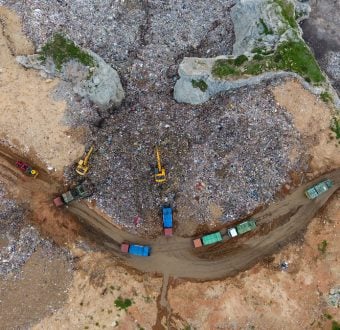Planeta G is back for Season 2 where we’re telling the real stories of powerful Latinx/Latine activists who are fighting for their communities. If you missed the first two episodes of this season, get caught up here: read about episode 1 | watch episode 1, read about episode 2 | watch episode 2.
For many, California seems like a beacon of environmental progress. But the truth is, more than 2.7 million people in California live within less than a mile of an oil or gas well. For many, especially Latine/Latinx and other BIPOC communities, when they look out the window of their homes, schools and hospitals, they see oil rigs bobbing up and down a few feet away, extracting oil day in and day out. Kern County is the epicenter of extraction in California, with over 70% of the state’s oil and gas wells. (Kern County is also over half Latine/Latinx).
While other states have enacted buffer zones between homes and oil and gas wells, California has lagged in regulating the industry. Instead, what we are seeing in California are “sacrifice zones,” Black, Latine/Latinx, Indigenous, and low-income neighborhoods that are “sacrificed” to drilling in California. BIPOC make up 9 out of 10 residents who live near oil and gas wells and the most polluted communities.

A person walking from Arvin High School, where a nearby major gas leak from the Petrocapital Resources Jewett 1,2,3 well sites had displaced people from their homes for more than eight months in 2014, passes pumpjacks at the Petro Capital Richards Lease 1-1 Well-site, a quarter mile from the school, in Arvin, California. Fossil fuel infrastructure in Arvin, California. Kern County, whose population is over half Latinx, is home to a bulk of California’s oil production and agriculture. Facing the simultaneous challenges of fossil fuel racism and being in the center of the climate crisis, Kern County farmworker communities face interconnected and deliberate capitalist crises on all fronts.
This is not without major health consequences, as we discussed in episode 1. For example, the childhood asthma rate for Kern County is three times the state average, while other health complications, like cancer, preterm births, and respiratory illnesses are also more common. If you want to learn more about the health effects of living near oil drilling sites, check out our episode with Nalleli Cobo from season 1 of Planeta G. In this episode, Nalleli a young environmental justice organizer who has been fighting to change the rules her whole life, talks about the struggles of living next to oil extraction sites and her cancer diagnosis. Nalleli has now been cancer free for one year.
A move in the right direction
In this episode of Planeta G, Juan Flores from the Center on Race, Poverty, & the Environment takes us into Kern County to show us what oil extraction sites next to schools and homes look like. He also discusses how communities are fighting for their rights to a safe, healthy future and the steps California is taking to create more protection between fossil fuel sites and communities.
In a long-anticipated move against California’s oil industry, Governor Newsom and his administration released a new proposal for a 3,200-foot buffer zone between new oil and gas wells and sensitive locations like homes, schools, and hospitals last October.
Unfortunately, under the proposed rule, existing wells would be allowed to remain close to neighborhoods, with some protections put in place, such as installing monitoring equipment and containment systems, aimed to reduce the health risks to nearby residents.
But this is not the end of the road. Organizers like Juan are demanding stronger regulations and better safety mechanisms for Latinx/Latine and other communities of color.
Watch the full episode!
So what can you do? Right now millions of Californians are living with toxic oil and gas drilling in their backyards. If you live in California, call on Governor Newsom to stand up for the strongest possible protection for communities living near drilling.




